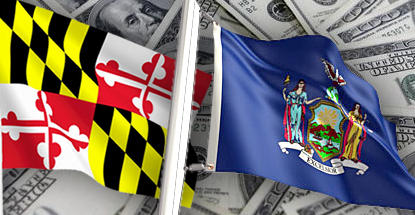 Maryland’s four casinos reported an 8% gaming revenue rise in June to $72m. As ever, Maryland Live! claimed the lion’s share of the takings, reporting $56.5m in revenue, up 10% over the same month last year and the venue’s 14th straight month of +$50m receipts. Hollywood Casino Perryville’s take fell 10% to $7m, while Ocean Downs held firm at $4.8m. Rocky Gap, which opened in late May 2013, reported a 50% surge in year-on-year revenue but still brought up the rear with $3.7m.
Maryland’s four casinos reported an 8% gaming revenue rise in June to $72m. As ever, Maryland Live! claimed the lion’s share of the takings, reporting $56.5m in revenue, up 10% over the same month last year and the venue’s 14th straight month of +$50m receipts. Hollywood Casino Perryville’s take fell 10% to $7m, while Ocean Downs held firm at $4.8m. Rocky Gap, which opened in late May 2013, reported a 50% surge in year-on-year revenue but still brought up the rear with $3.7m.
June also represents the end of the state’s fiscal year, during which the four casinos earned a combined $833m in gaming revenue. Maryland Live! contributed nearly 80% ($654.4m) of the total take. The Maryland Lottery and Gaming Control Agency estimates that the statewide annual total could eventually rise as much as $425m following next month’s launch of the Horseshoe Casino in Baltimore, but the new kid in town could trim as much as $130m from Maryland Live!’s share. Both casinos will face additional competition when the state’s sixth and final casino, MGM Resorts’ $925m National Harbor facility, opens in July 2016.
A little further north in New York, a new report shows companies vying to receive one of the state’s four new casino licenses have spent $11m over the past two years lobbying state and local politicians. The New York Public Interest Research Group (NYPIRG) fingered Malaysia’s Genting Group as the biggest political sugar daddy, contributing nearly $3.5m to chase two potential properties in Orange and Sullivan counties. That was over five times the $666k spent by Empire Resorts, the second largest contributor.
Caesars Entertainment spent $319k in lobbying and added a further $100k to state and local political action committees, while Caesars’ partner in a proposed Long Island casino, Flaum and Flaum Management Co., spent a combined $361k. Genting also led the casino lobbying in the first two months of 2014, spending over $160k, three times that of its nearest competitor, the New York Gaming Association.
